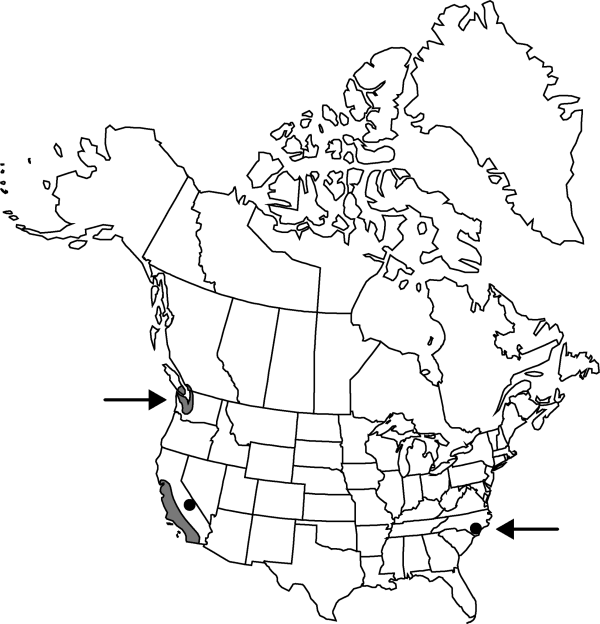Difference between revisions of "Chenopodium macrospermum"
Fl. Antarct. 2: 341. 1846.
FNA>Volume Importer |
imported>Volume Importer |
||
| (2 intermediate revisions by 2 users not shown) | |||
| Line 6: | Line 6: | ||
|place=2: 341. 1846 | |place=2: 341. 1846 | ||
|year=1846 | |year=1846 | ||
| + | }} | ||
| + | |special_status={{Treatment/ID/Special_status | ||
| + | |code=I | ||
| + | |label=Introduced | ||
}} | }} | ||
|basionyms= | |basionyms= | ||
| Line 35: | Line 39: | ||
|elevation=0-10 m | |elevation=0-10 m | ||
|distribution=B.C.;Calif.;N.C.;Wash.;South America (Argentina;Bolivia;Paraguay). | |distribution=B.C.;Calif.;N.C.;Wash.;South America (Argentina;Bolivia;Paraguay). | ||
| + | |introduced=true | ||
|discussion=<p><i>Chenopodium macrospermum</i> is native and diverse in South America. Much, if not all, of the North American material is introduced from there and appears to represent more than one part of the variation. Until a reliable treatment of the South American material is published we are not assigning names to the variants in North America.</p> | |discussion=<p><i>Chenopodium macrospermum</i> is native and diverse in South America. Much, if not all, of the North American material is introduced from there and appears to represent more than one part of the variation. Until a reliable treatment of the South American material is published we are not assigning names to the variants in North America.</p> | ||
|tables= | |tables= | ||
| Line 58: | Line 63: | ||
|publication title=Fl. Antarct. | |publication title=Fl. Antarct. | ||
|publication year=1846 | |publication year=1846 | ||
| − | |special status= | + | |special status=Introduced |
| − | |source xml=https:// | + | |source xml=https://bitbucket.org/aafc-mbb/fna-data-curation/src/2e0870ddd59836b60bcf96646a41e87ea5a5943a/coarse_grained_fna_xml/V4/V4_516.xml |
|genus=Chenopodium | |genus=Chenopodium | ||
|subgenus=Chenopodium subg. Blitum | |subgenus=Chenopodium subg. Blitum | ||
Latest revision as of 21:59, 5 November 2020
Stems erect to decumbent, branched from base, 1–6 dm, farinose. Leaves nonaromatic; petiole 0.01–0.25 cm; blade deltate or trullate to narrowly trullate, rarely lanceolate, 0.8–6 × 0.4–3.6 cm, base cuneate, margins serrate, apex acute. Inflorescences glomerules in terminal dense spikes; glomerules subglobose, 3–5 mm diam.; bracts absent. Flowers: perianth segments connate into 0.5 mm tube; lobes deltate, 0.2–0.3 × 0.7–0.8 mm, apex acute, not keeled, glabrous, covering fruit at maturity; stamen 1; stigmas 2. Achenes ovoid; pericarp adherent, smooth. Seeds ovoid, 0.9–1.1 mm diam., margins rounded; seed coat black, reticulate-punctate. 2n = 36.
Phenology: Fruiting Jun–Sep.
Habitat: Beach, dry lake and creek beds, marshes and muddy areas, waste areas
Elevation: 0-10 m
Distribution

Introduced; B.C., Calif., N.C., Wash., South America (Argentina, Bolivia, Paraguay).
Discussion
Chenopodium macrospermum is native and diverse in South America. Much, if not all, of the North American material is introduced from there and appears to represent more than one part of the variation. Until a reliable treatment of the South American material is published we are not assigning names to the variants in North America.
Selected References
None.